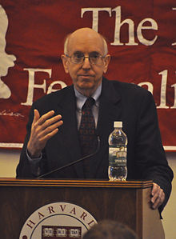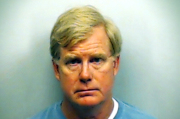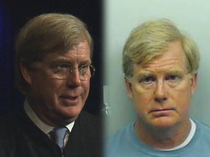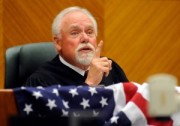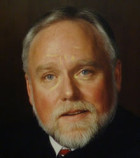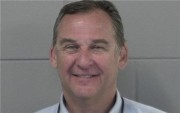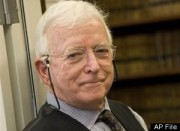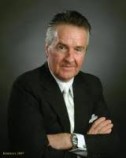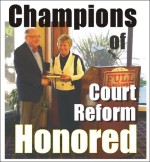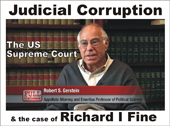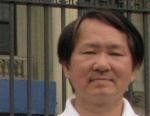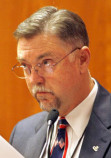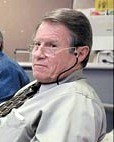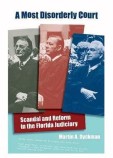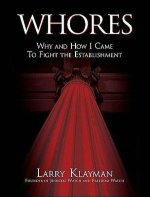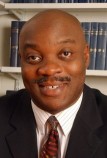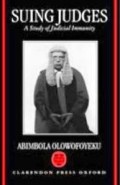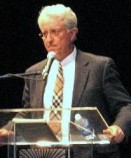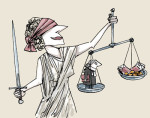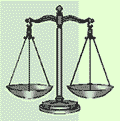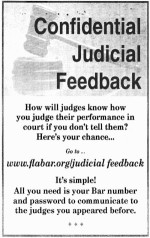The Lawyer-Judge Bias in the American Legal System
About RobeProbe
RobeProbe - World's most trusted judge rating site!
RobeProbe is here!!! The only comprehensive website that allows lawyers and litigants to rate the judicial performance of judges and bankruptcy trustees in a civilized,
easy to use forum. RobeProbe will revolutionize the legal community and the courts. Did you ever walk into a courtroom totally prepared for your case, but completely unprepared for the curve balls a
judge could throw at you? Did you ever go to court knowing very little about a judge, and come out knowing how great or how terrible that judge is by just spending five minutes before him or her?
Well, with RobeProbe on your side you will be prepared for both your case and the judge--and you'll know the judge before you enter the courthouse. Read more
The Crisis of Capitalist Democracy, Judge Posner
Richard Posner
Wikipedia
Richard Allen Posner (born January 11, 1939) is an American jurist and economist, who is a judge on the United States Court of Appeals for the Seventh Circuit in Chicago and a Senior Lecturer at the University of Chicago Law School. He is a leading figure in the field of law and economics, and was identified by The Journal of Legal Studies as the most cited legal scholar of the 20th century.[1]
Posner is the author of nearly 40 books on jurisprudence, economics, and several other topics, including Economic Analysis of Law, The Economics of Justice, The Problems of Jurisprudence, Sex and Reason, Law, Pragmatism and Democracy, and The Crisis of Capitalist Democracy. Posner has generally been identified as being politically conservative; however, in recent years he has distanced himself from the positions of the Republican party.[2] Read more
Richard A. Posner, Judge, United States Seventh Circuit Court of Appeals Senior Lecturer, University of Chicago Law School
Richard A. Posner, University of Chicago Law School
Federal judge resigns nearly a year after his arrest
ABA Journal
By Debra Cassens Weiss
Jun 01, 2015
Corrected: U.S. District Judge Mark Fuller of Alabama has announced he will resign effective Aug. 1, nearly a year after he was arrested for allegedly assaulting his then-wife at the Ritz-Carlton in Atlanta.
Fuller announced the resignation on Friday, report the Montgomery Advertiser, Al.com, the Daily Report (sub. req.) and the New York Times.
After Fuller’s arrest, the Atlanta-based 11th U.S. Circuit Court of Appeals reassigned his cases and appointed a special committee to investigate. Fuller received counseling for domestic violence as part of a pretrial diversion program, which led to dismissal of the battery charge against him.
Fuller’s lawyer, Barry Ragsdale, told the Daily Report that he couldn’t comment on the status of the judiciary’s investigation. "I cannot comment on the status of the investigation, where it is, or whether the committee has reported or not," Ragsdale said. The publication asked Ragsdale whether Fuller would receive any retirement benefits, and Ragsdale said he couldn’t elaborate.
Updated on June 2 to correct the location of the alleged assault to the Ritz-Carlton in Atlanta. Read more
______________________________________________
Mark Fuller Wikipedia
Mark Everett Fuller (born 1958 in Enterprise, Alabama) is a United States District Judge of the United States District Court for the Middle District of Alabama. Fuller is "most recognizable" for presiding over the controversial case of former Alabama Governor Don Siegelman.[1] Fuller has tendered his resignation to President Obama, effective August 1, 2015. Read more
Judicial-Council-Order-Mark-Fuller.pdf
Adobe Acrobat document [52.6 KB]
carnes-tjoflat-letter.pdf
Adobe Acrobat document [142.7 KB]
Los Angeles Times
By Timothy M. Phelps
March 15, 2015
Federal District Judge Mark E. Fuller was controversial even before he was arrested on allegations of beating his wife last year.
The Alabama judge was criticized for sitting on cases brought by the government even as his aviation company was getting hundreds of thousands of dollars in taxpayer-funded business. Appointed by a Republican, he was denounced for putting a former Democratic governor in manacles after a corruption conviction.
He was the talk of the courthouse for having an extramarital affair with his courtroom assistant, and for his messy public divorce.
Fuller, 56, is now battling bipartisan calls to resign over a fight he had seven months ago with the same former courtroom assistant, whom he'd married. The argument started after she accused Fuller of cheating on her with his law clerk. Read more
 Federal judges called upon state Atty. Gen. Kamala D. Harris to respond to reports of a pattern of prosecutorial misconduct going undisciplined in state courts. (Damian Dovarganes / Associated Press)
Federal judges called upon state Atty. Gen. Kamala D. Harris to respond to reports of a pattern of prosecutorial misconduct going undisciplined in state courts. (Damian Dovarganes / Associated Press)
U.S. judges see 'epidemic' of prosecutorial misconduct in state
Los Angeles Times
By Maura Dolan
January 31, 2015
The hearing seemed largely routine until a state prosecutor approached the lectern.
Deputy Atty. Gen. Kevin R. Vienna was there to urge three judges on the U.S. 9th Circuit Court of Appeals to uphold murder convictions against Johnny Baca for two 1995 killings in Riverside County. Other courts had already determined that prosecutors had presented false evidence in Baca's trial but upheld the verdicts anyway.
Vienna had barely started his argument when the pummeling began.
Judge Alex Kozinski asked Vienna if his boss, Atty. Gen. Kamala D. Harris, wanted to defend a conviction "obtained by lying prosecutors." If Harris did not back off the case, Kozinski warned, the court would "name names" in a ruling that would not be "very pretty."
Judge Kim Wardlaw wanted to know why Riverside County prosecutors presented a murder-for-hire case against the killer but did not charge the man they said had arranged the killings.
"It looks terrible," said Judge William Fletcher.
The January hearing in Pasadena, posted online under new 9th Circuit policies, provided a rare and critical examination of a murder case in which prosecutors presented false evidence but were never investigated or disciplined.
The low-profile case probably would have gone unnoticed if not for the video, which attorneys emailed to other attorneys and debated on blogs.
In a series of searing questions, the three judges expressed frustration and anger that California state judges were not cracking down on prosecutorial misconduct. By law, federal judges are supposed to defer to the decisions of state court judges.
Prosecutors "got caught this time but they are going to keep doing it because they have state judges who are willing to look the other way," Kozinski said. Read more
No Gains Reported in Diversity of Federal Law Clerks
No Gains Reported in Diversity of Federal Law Clerks
ABA Journal Law News Now
By Debra Cassens Weiss
May 4, 2012
Concerns about the low number of minorities clerking for federal judges haven’t led to improvements.
The percentage of federal judicial law clerks who are black or Hispanic remained about the same for the last two fiscal years, according to new statistics released this
week. The National Law Journal has the story.
The long-range federal statistics are even less encouraging. Between fiscal years 2006 and 2010, the percentage of African-Americans clerking for appeals judges dropped
from 3.5 percent to 2.4 percent, while the percentage clerking for district judges dropped from 3.5 percent to 3.2 percent.
For those same years, the percentage of Hispanics clerking for appeals judges dropped from 3.1 percent to 2 percent, while the percentage clerking for district judges
stayed the same at 3.3 percent. Read more
In wake of 'Taj Mahal' scandal, Florida Supreme Court approves new lobbying rules for judges
In wake of 'Taj Mahal' scandal, Florida Supreme Court
approves new lobbying rules for judges
Tampa Bay Times
By Lucy Morgan
April 11, 2012
TALLAHASSEE — Stung by public reaction to judges who lobbied state lawmakers into a $50 million courthouse many have dubbed a "Taj Mahal,'' the Florida Supreme Court has
established new rules that would muzzle individual judges who try to have their way with the Legislature.
And some judges are not happy. The state's circuit court judges have formally asked the state's highest court to rescind the rules and at least engage in a public
discussion of rules that would constrain their right to speak out in public. Judges at the 5th District Court of Appeal also have filed a formal objection to a provision that would establish term
limits on chief judges.
The rules, approved by a sharply divided court in February, would prevent individual judges from taking their budget requests and suggestions for changing the law
directly to lawmakers without first getting approval from the Supreme Court and administrative committees that oversee the budget.
In addition, the state's highest court has imposed an eight-year term limit on the service of all chief judges and requires them to be selected on the basis of their
managerial, administrative and leadership skills. Read more
Chief Federal Judge Richard Cebull sends racist joke about President Obama using court’s email
Chief Federal Judge in Montana Says He’s Not a Racist,
Apologizes for Obama Email
ABA Journal Law News Now
By Debra Cassens Weiss
March 1, 2012
Updated: Chief U.S. District Judge Richard Cebull of Montana is acknowledging he sent a racist joke about President Obama’s parentage in an email forwarded to six "old
buddies."
The Great Falls Tribune obtained the email. It reads: "A little boy said to his mother, 'Mommy, how come I'm black and you're white?' His mother replied, 'Don't even go
there Barack! From what I can remember about that party, you're lucky you don't bark!' "
Cebull apologized for the email, telling the Great Falls Tribune and the Billings Gazette that he is not a racist.
He forwarded the text from his office computer on Feb. 20.
The newspapers differ over whether Cebull's brother forwarded him the email, or whether Cebull forwarded it to his brother. The Great Falls Tribune says Cebull got the
email from his brother, then forwarded it to his personal email address and six "old buddies."
"To say it's inappropriate and stupid is an extreme understatement," Cebull told the Billings Gazette. "There is no doubt it's racist. It wasn't forwarded for that
purpose. If anything, it was political."
Cebull, nominated by President George W. Bush, admits he is not an Obama supporter. He told the Billings Gazette he doesn’t blame people if they think he’s racist, but
it’s not true. "The fact is that isn't how I've conducted myself as a federal judge. Never has anybody asserted I was racist," he said.
On Thursday, Cebull reported his conduct to the Judicial Council of the San Francisco-based 9th U.S. Circuit Court of Appeals and sent a letter of apology to
Obama.
"I sincerely and profusely apologize to you and your family for the email I forwarded," Cebull wrote to the president. "I accept full responsibility; I have no one to
blame but myself. I can assure you that such action on my part will never happen again. I have requested that the Judicial Council of the 9th Circuit review this matter. Honestly, I don't know what
else I can do. Please forgive me and, again, my most sincere apology."
Updated on March 2 to report that Cebull has reported his conduct to the 9th Circuit and written to President Obama. Read more
Richard F. Cebull
Wikipedia
Richard Frank Cebull (born 1944) is a United States District Judge for the United States District Court for the District of Montana… On February 20, 2012, Cebull used
his official courthouse email address to forward to seven friends an email containing a racist joke about President Barack Obama. Cebull said he "didn't send it as racist," but rather "sent it out
because it's anti-Obama." On March 1, 2012, Cebull initiated a misconduct complaint against himself with the Ninth Circuit and sent a letter of apology to Obama and his family. Several organizations
and publications called for his resignation or impeachment. Read more
Chief Judge Rucker Smith arrested for D-U-I
Judge accused of driving under the influence reprimanded
mysouthwestga.com
by Sarah Bleau
March 29, 2012
LESLIE, GA --
A South Georgia Judge who was arrested last year for driving under the influence of alcohol was reprimanded. Rucker Smith, Chief Judge of the Superior Court of the
Southwest Judicial Circuit, plead guilty in open court to a reduced charge of reckless driving in the Municipal Court in the City of Leslie.
In May 2011, officials say Smith self-reported his arrest to the Judicial Qualifications Commission; the commission says a personal conference with Smith about the facts
and a resolution were held on June 24, 2011. In the Municipal Court for the City of Leslie, Smith submitted his guilty plea in open court to a reduced charge of reckless driving.
Smith's reprimand is private and the details cannot be released to the public, according to the commission.
The commission says on May 28, 2011, Smith was arrested by the Leslie Police Department for driving under the influence of alcohol. They say Smith was pulled over by a
patrol officer for allegedly driving 63 miles per hour in a 45 mile per hour zone on US Highway 280. They say Smith then refused the field sobriety tests and was arrested on charges of speeding, open
container, and driving under the influence (refusal). Read more
- Also reported by the ABA Journal Law News Now
- Judge Rucker Smith arrested for D-U-I
Federal Judge Recommends Criminal Charges for Lawyers Who Questioned His Impartiality
Federal Judge Recommends Criminal Charges for Lawyers Who Questioned His Impartiality
ABA Journal Law News Now
By Debra Cassens Weiss
January 11, 2011
U.S. District Judge John McBryde of Fort Worth, Texas, has sanctioned three lawyers and recommended criminal charges against two of them for motions questioning his
integrity in litigation over golf club patents.
McBryde said the plaintiff in the litigation, John Gillig, had used comments the judge had "jokingly" made about contingency fees to support a "fictitious scenario" of bias, according to his 114-page
opinion (PDF) issued Jan. 5. McBryde imposed sanctions, even though he could have asked another judge to rule on the issue, the Fort Worth Star-Telegram reports. Read more
Federal Judge Busted with Stripper, Drugs and Guns
Department of Justice
Office of Public Affairs
FOR IMMEDIATE RELEASE
Friday, November 19, 2010
WASHINGTON – Senior U.S. District Judge Jack T. Camp Jr., pleaded guilty today in U.S. District Court in Atlanta to possession of controlled substances and conversion of government property, announced Assistant Attorney General Lanny A. Breuer of the Criminal Division, Special Agent in Charge Brian D. Lamkin of the FBI’s Atlanta office and Director Vernon Keenan of the Georgia Bureau of Investigation.
Camp, 67, a Senior U.S. District Judge in the Northern District of Georgia, pleaded guilty to two counts of unlawful possession of controlled substances and one count of conversion of government property. Camp’s guilty plea was accepted by Senior U.S. District Judge Thomas J. Hogan for the District of Columbia, who was sitting by designation in the Northern District of Georgia.
Sentencing has been scheduled for March 4, 2011, at 11:00 a.m.
As part of his guilty plea, Camp admitted that between May 2010 and Oct. 1, 2010, he unlawfully possessed and used cocaine, marijuana and Roxycodone, a Schedule II controlled substance. Camp also admitted to giving an individual, whom he knew had a prior felony drug conviction, money to purchase cocaine, Roxycodone and marijuana. Camp admitted that he unlawfully gave the individual a U.S. District Court laptop computer for her personal use. Camp was arrested on Oct. 1, 2010, after attempting to purchase drugs from an undercover FBI agent posing as a drug dealer.
The case is being prosecuted by Trial Attorneys Deborah Sue Mayer and Tracee Joy Plowell of the Criminal Division’s Public Integrity Section. The case was investigated by the FBI Atlanta’s Public Corruption Squad. The Georgia Bureau of Investigation provided substantial assistance in this case. 10-1328 Criminal Division. more
Former Federal Judge Edward "Naughty" Nottingham
Edward Nottingham
Wikipedia
Edward Willis Nottingham, Jr. (born 1948) is a former United States federal judge in the United States District Court for the District of Colorado having served in that
office from November 24, 1989 until his resignation on October 21, 2008…
Inquiry and resignation
Nottingham drew controversy over two incidents in 2007-2008, when it was revealed in his divorce case that the judge "spent $3,000 on strippers in one
night".
AP reported that the Diamond Cabaret manager Justin Frankell said the judge had visited the strip club on other occasions. They reported that 9 News reported that
Nottingham said he could not remember the details of spending the $3,000 at the Diamond Cabaret on 9/05/05 because he had been drinking. The transcript also said Nottingham had paid $150 to use an
Internet dating site, Ipayfriendfinder.com. His ex wife reported that she learned of the dating service calls when she mistakenly opened a bill, and immediately confronted her husband in his
chambers. "When I asked about the dating service, he turned around in his chambers, and he hit his computer and he told me all about the dating service; it was a porn site." Read more
Bill Moyers Journal: Justice For Sale
Bill Moyers Journal: Justice For Sale
How would you feel if you were in court and knew that the opposing lawyer had contributed money to the judge's campaign fund? This is not an improbable hypothetical
question, but could be a commonplace occurrence in the 21 states where judges must raise money to campaign for their seats — often from people with business before the court.
Though many states have elected judges since their founding, in the past 30 years, judicial elections have morphed from low-key affairs to big money campaigns. From 1999-2008, judicial candidates
raised $200.04 million, more than double the $85.4 million raised in the previous decade (1989-1998).
Because of the costs of running such a campaign, critics contend that judges have had to become politicians and fundraisers rather than jurists. In a poll by Justice at Stake, 97% of elected state
Supreme Court justices said they were under pressure to raise money during their election years. Read
more
Bill Moyers, Justice For Sale (part 1). YouTube
"We are in a system where [judicial] elections can be bought"
February 19, 2010 - Bill Moyers Journal takes a hard look at how campaign cash in judicial races may sway America's courts. The Journal revisits the 1999 FRONTLINE special "Justice for Sale" which looked at the growing concern - even among Supreme Court justices themselves - that campaign contributions may be corrupting the judicial process.
Bill Moyers, Justice For Sale (part 2). YouTube
February 19, 2010 - Bill Moyers Journal takes a hard look at how campaign cash in judicial races may sway America's courts. The Journal revisits the 1999 FRONTLINE special "Justice for Sale" which looked at the growing concern - even among Supreme Court justices themselves - that campaign contributions may be corrupting the judicial process.
Richard I. Fine & Associates
Richard Fine is reestablished as a strategic consultant with Richard I. Fine & Associates. Unfortunately The State Bar of California shows Current Status: Disbarred for Richard Isaac Fine - #55259. This member is prohibited from practicing law in California by order of the California Supreme Court.
Unfortunately Mr. Fine paid a heavy price for exposing corruption.
Lawyer abruptly freed from jail
Los Angeles Times
By Scott Glover
September 18, 2010
Richard Fine, 70, had spent a year and a half behind bars on contempt charges.
A 70-year-old lawyer who was sentenced to jail "indefinitely" on contempt-of-court charges was abruptly released Friday evening after spending a year and a half behind
bars.
Richard Fine was released from Los Angeles County Jail in downtown Los Angeles shortly after 9 p.m. but did not wish to speak to a Times reporter, said his daughter,
Victoria.
Fine, an antitrust and taxpayer advocate attorney, was thrown in jail last year by Superior Court Judge David P. Yaffe for failing to answer questions about his finances
and for practicing law without a license.
The contempt charges stemmed from a case Fine filed on behalf of Marina del Rey homeowners who sued local developers.
Fine had been ordered to pay sanctions and attorneys' fees in the case. Fine contends he was being targeted by Yaffe because of his challenges to county-funded benefits
that judges receive on top of their state pay.
Rather than comply with Yaffe's orders and be released from jail, Fine vowed to take his case all the way to the U.S. Supreme Court.
In May, however, the court declined to take up his petition, meaning he could have remained in jail indefinitely as Yaffe had ordered.
The judge could not be reached for comment late Friday.
While in solitary confinement, Fine filed habeas corpus petitions for his release with the California Supreme Court, District Court and the U.S. 9th Circuit Court of
Appeals, alleging that Yaffe was biased against him and should have recused himself from the contempt-of-court case.
His imprisonment was "the latest encounter in the 10-year campaign by Fine to restore due process in the California judicial system," the attorney, who has been
representing himself, wrote in his petition to the U.S. Supreme Court.
"Fine is the only attorney, of the approximately 208,000 California attorneys, with the courage to challenge the California judiciary," he wrote.
In a telephone interview with The Times in May, Fine said the U.S. Supreme Court had made the wrong decision by allowing him to remain in jail.
He said he would be filing another petition.
"I'm in fighting condition," he said. "They haven't broken me down, and they won't break me down." Read more
Attorney Richard Fine spent a year and a half behind bars on contempt-of-court charges. Is that justice?
Ex-lawyer jailed 14 months, but not
charged with a crime
CNN Special Investigations Unit
By Abbie Boudreau, Emily Probst and Dana Rosenblatt
May 24, 2010
Once a dapper Beverly Hills attorney known for his bow tie, Richard Fine has been held in solitary confinement at Los Angeles County Men's Central Jail for 14 months,
even though he's never been charged with a crime.
Fine, a 70-year- old taxpayer's advocate who once worked for the Department of Justice, is being held for contempt of court.
Superior Court Judge David Yaffe found Fine in contempt after he refused to turn over financial documents and answer questions when ordered to pay an opposing party's
attorney's fees, according to court documents.
Fine says his contempt order masks the real reason why he's in jail. He claims he's a political prisoner.
"I ended up here because I did the one thing no other lawyer in California is willing to do. I took on the corruption of the courts," Fine said in a jailhouse interview
with CNN.
For the last decade, Fine has filed appeal after appeal against Los Angeles County's Superior Court judges. He says the judges each accept what he calls yearly "bribes"
from the county worth $57,000. That's on top of a $178,789 annual salary, paid by the state. The county calls the extra payments "supplemental benefits" -- a way to attract and retain quality judges
in a high-cost city.
While the practice of paying supplemental benefits is common in California, most high-cost cities elsewhere don't hand out these kinds of benefits. Judges in Miami,
Chicago and Boston receive no extra county dollars.
Judges in Los Angeles County not only have the highest state salaries in the nation, they also get tens of thousands of dollars in county benefits. These payments, Fine
says, mean judges are unlikely to rule against the county when it is involved in a lawsuit. Read more
Full Disclosure website
Full Disclosure blog
Former LA Attorney Richard Fine Jailed Indefinitely FindLaw.com
The Incarceration of Attorney Richard I. Fine (Part 1) Tulanelink.com
Richard I Fine "coercive confinement"
Full Disclosure
by Leslie Dutton
May 28, 2010
Los Angeles, CA Here is an exclusive five minute video update on developments in the Richard I Fine "coercive confinement" case following the U S Supreme Court's second
denial of his petitions seeking to be released from the notorious L. A. County Jail. Fine has been held without charge or conviction of a crime for almost a year and a half following his attempt to
disqualify the judge who has admitted in court testimony to have accepted payments from a party involved in the case before him.
Fine, is a former U S Department of Justice Anti-Trust Prosecutor who has been representing himself from his solitary jail cell in the notorious L. A. County Central
Men's Jail. The video covers abuse of court procedures and the how all Civil Lilbertarian organizations have failed to engage in this case that involves a major threat to "Due Process" and "Civil
Rights" in America.
Described here are the circumstances that led up to Dr. Richard Fine's decision to keep on fighting from his jail cell even after the Supreme Court refused to consider
the illegal payments made to Judge David Yaffe who ordered Fine held indefinitely in contempt of court following Fine's exposing the court's corruption. Confident in his moral position Fine remains
in jail and dedicated to what he believes is a moral and principled position. Read more
Was Sunny Sheu Murdered? Corruption Activist Dead
Was Sunny Sheu Murdered?
Judicial Corruption Activist Dead
From 4closureFraud
Sunny Sheu has been fighting judicial corruption since his home was stolen by mortgage fraud allegedly aided and abetted by Judge Joseph Golia of Queens.
Sunny was kidnapped, intimidated and threatened by two NYPD detectives at the Queens DA bureau. He was told by the detectives that if he took his case to the media or
filed a complaint against Golia he would be killed.
Sunny was told by the Captain of the 109th pct that the cops detained him because he had put a letter in Golia’s mailbox, proving it was Golia that ordered the illegal
detention.
Later, Sunny uncovered evidence of misrepresentations on Golia’s financial disclosure statements and on Thursday, June 24, 2010 he announced that he had evidence
sufficient to have Golia arrested.
Two days later Sunny was found dead with trauma to the head, according to the Medical examiner that performed the autopsy: http://www.youtube.com/watch?v=ItS1XpnY4kk
Two months ago, Sunny made the above video, stating that if any harm came to him, Golia should be the main suspect.
Sunny also wrote a letter to FBI agent Rachel Rojas, asking for witness protection. Obviously his request was ignored. Read more. Also on Zero Hedge, Being Middle Class, and Parent Advocates
Citizens for Judicial Accountability
CJA goes beyond the facade
To show you the denial of fundamental rights by judges and lawyers who place themselves not only above the law, but beyond the law, with actual cases of individuals,
stories of lawyers and judges who failed to conform, and with reports issued by courts and by organizations, demonstrating an urgent need for judicial reform in the civil justice system, that
operates as an independent branch of government is wholly unaccountable, is broken, is totally unregulated, can be unjust and unfair and can ruin you. Read more
Hillsborough Circuit Judge Gregory P. Holder
Gregory Holder was elected county judge in 1994. In 1996 Judge Holder was elected Circuit Judge for Thirteenth Judicial Circuit, Hillsborough County, Florida. His latest assignment was in the family law division. Judge Holder has a reputation for speaking his mind and for being extremely open with the press. He has the attitude that the entire justice system belongs to the people, that there should be nothing to hide and that the public should know what is going on. Judge Holder refused to be drawn into "inside politics" by dishonest Hillsborough judges. Judge Holder was bent on rooting out and ridding the court system of corruption. Read more
Read the grand jury presentment
Grand Jury Finds Judges Had Sex in Hillsborough Court
Presentment finds scandal, still no indictment
2000, 12-08-00, Grand Jury Presentment, [...]
Adobe Acrobat document [470.0 KB]
Report: Web of scandal at Hillsborough courthouse
Records describe accusations of sexual
affairs and secret safe deposit boxes
By CHRISTOPHER GOFFARD and JEFF TESTERMAN
St. Petersburg Times
TAMPA -- A months-long inquiry into the Hillsborough County courthouse has found accusations ranging from sexual affairs in a judge's chambers to death threats and secret safe deposit boxes. Read more
Judge Holder Seeks $1.92 Million Defending Self
Judge
seeks $1.92-million in costs defending self
By CANDACE RONDEAUX, St. Petersburg Times, Published July 26, 2005
Judge Holder Awarded $70,000 by FL Supreme Court
Tampa judge to be reimbursed $70,000 in plagiarism case
By TOM BRENNAN, The Tampa Tribune
September 25, 2009
Judge Walker Asleep During Trial? Does Not Matter
Judge asleep? Doesn't matter
Tampa Bay Times
By MOLLY MOORHEAD
May 5, 2006
Unless an official complaint is filed, nothing will happen about Judge David Seth Walker's alleged nap.
DADE CITY - His own bailiffs say Judge David Seth Walker dozed off during part of a criminal trial this week, and it appears no one is going to do anything about
it.
After the man on trial was acquitted Thursday, his attorney in the Public Defender's office dropped the issue.
"We're not going to complain of any errors whatsoever. We have no complaint," said Assistant Public Defender Dillon Vizcarra, who earlier this week gathered evidence of
Walker's on-the-bench snoozing.
Walker, who is 65 and retired but handles some trials in Pasco's overflowing court docket, said he did not fall asleep.
Assistant State Attorney Phil Van Allen prosecuted the sexual battery case. He said the record supports Walker.
And neither Judge David Demers, chief of the 6th Judicial Circuit, nor anyone else will do anything unless an official complaint is filed.
"It's not up to the chief judge or the circuit or anyone else to deal with the judge or his actions in a courtroom," circuit spokesman Ron Stuart said. "It's not our
policy - it's state law. One judge has no authority over another."
Here's what happened in Courtroom B on Monday during of State of Florida vs. Richard Hill , according to affidavits:
After the state's key witness finished testifying, Vizcarra and Van Allen both said they had no more questions. Walker, whose eyes were closed, didn't
respond.
One bailiff called out, "Judge" but still got no response.
"I then walked up to the bench and nudged the judge on the arm 2-3 times before the judge finally opened his eyes and awoke," bailiff Jack Wolf wrote in an
affidavit.
The words mirror affidavits given by Frank Inversso, the other bailiff, and two attorneys with the Public Defender's Office who were observing the trial.
Thursday afternoon, after deliberating for about two hours, the jury of five women and one man found Richard Hill of Shady Hills not guilty of capital sexual battery
against a then-8-year-old boy.
Had Hill been convicted, the defense would certainly have raised the question whether the judge was sleeping at any point in the trial. What's uncertain is whether it
would have mattered.
"The law about sleeping judges is fairly deferential to sleeping judges," said Robert Batey, a law professor at Stetson University College of Law in St. Petersburg.
"It's not just enough that the judge fell asleep during the trial."
But start asking around a courthouse, Batey said, and you'll hear that it happens.
"If you talk to lawyers, and they start telling war stories, then you do hear about jurors falling asleep, lawyers falling asleep, and also judges falling asleep," Batey
said.
Jerold H. Israel, who teaches criminal procedure at the University of Florida Levin College of Law, said the issue is even less relevant during a jury trial and in
moments when there's nothing to rule on.
"Whether the judge was awake or asleep becomes irrelevant because there was nothing for him to do," Israel said.
Walker, who retired in 2002 as the longest serving circuit judge in Florida, said he remembers the moments described in the affidavits, and remembers being
awake.
"I remember when Mr. Vizcarra finished and Mr. Van Allen said, "I have no further questions.' I remember the bailiff coming up to me and I turned and looked at him when
he came up right to my side," Walker said.
"In the past people have misinterpreted my quietness as inattentiveness."
While acknowledging the allegation is embarrassing, Walker praised Vizcarra for raising the issue.
"I think what he did was absolutely appropriate because it's his job to represent his client," Walker said.
Walker denied Vizcarra's motion for a mistrial and a motion seeking a hearing about the sleeping allegation. Because there had been no objections during the
cross-examination, and Walker did not have to intervene at all, he said a hearing was unnecessary.
"There were no matters of law considered during the time. The jury listened and heard," he said.
"Without the robe," Walker he said, "a judge is just a normal everyday human being, and fallibilities exist." Read more
David Seth Walker is a senior judge up for comments, according to the Florida Bar News page 5 of the March 15, 2012 edition.
A Most Disorderly Court: Scandal and Reform in the Florida Judiciary The Florida Squeeze
by Martin Dyckman, Author
In the 1970s, justices on the Florida Supreme Court were popularly elected. But a number of scandals threatened to topple the court until public outrage led to profound reforms and fundamental changes in the way justices were seated.
"This is a fascinating account of a sordid chapter in the history of the Florida Supreme Court. It reads more like a novel than a history book; the story is engagingly told and beautifully written." - Ann Piccard, Stetson University "A nice snapshot of a moment in Florida's history that provides a glimpse of how business and power can corrupt a legal system anywhere." - Elizabeth Dale, University of Florida" Judicial Branch Books
The shoddy history of politicized courts, Tampa
Bay Times, By Martin Dyckman, Special to the Times, April 12, 2011
Dyckman to speak on 'A Most Disorderly Court', Tampa Bay Times, By Colette Bancroft, Times Book Editor, July 24, 2008
Malaprops Book Store, A Most Disorderly Court: Scandal and Reform in the Florida Judiciary (Hardcover)
Martin Dyckman: Voters respond to politicians’ racist ‘dog whistles’, ContextFlorida
Special interests take special interest in judicial elections, The Florida Bar News, By Gary Blankenship, July 15, 2012
National Judicial Conduct and Disability Law Project
National Judicial Conduct and Disability Law Project, Inc.
Nearly three decades ago, Congress enacted what is now Title 28 U.S.C. §351 et seq., the Judicial Conduct and Disability Act, by which anyone can file a complaint against a federal judge, charging him or her with misconduct or a disability impeding the judge's job performance. The statute is one component of a larger self-policing scheme for local, state and federal judges that apparent consensus deems ineffective. National Judicial Conduct and Disability Law Project, Inc. (NJCDLP) was accordingly created to help regulate America's judiciary by duly increasing its exposure to professional discipline, civil damages awards, and/or criminal prosecution for the knowing participation of judges in abuse of the American legal system. Read more
"Our legal system has frankly broken down, it has become a cesspool" - Larry Klayman, Esq.
Larry Klayman, Esq., founder and former chairman of the successful non-profit foundations Judicial Watch and of Freedom Watch, has dedicated his career to fighting
against injustice and restoring ethics to the legal profession and government.
Larry spoke to Book TV about his book "Whores, Why and How I Came to Fight the Establishment", and claims
"Our legal system has frankly broken down, it has become a cesspool"
"Judges not making decisions on the merits, but on the basis of feathering the nests of those who got them their jobs"
"Lawyers who don’t tell the truth"
Klayman has brought lawsuits against Hugo Chavez and OPEC, among others. Klayman details his legal battles with President and First Lady Bill and Hillary Clinton (Chinagate and Filegate), Vice President Dick Cheney (secret energy commission meetings), and the Bush administration over illegal wiretapping of American citizens. His portraits of the likes of Janet Reno, Fred Thompson, Arlen Spector, Judge Denny Chin (who recently presided over the Madoff trial) and other Clinton insiders Klayman considers unethical, and who have come back to power in the Obama administration, reveal not always flattering sides of their well-cultivated images. Klayman also has choice words to say about media figures such as Bill O'Reilly, Sean Hannity and Paula Zahn, and he accuses media mogul Rupert Murdoch of sandbagging the original publication of WHORES by HarperCollins because of the book's negative portrait of Roger Ailes and Fox News. Above all, WHORES is an impassioned plea for reform of our judicial system with a number of provocative suggestions.
Larry Elliot Klayman is a member of the Florida Bar, ID number 246220, admitted December 7, 1977. Klayman was reprimanded by the Supreme Court of Florida, case SC11-247 on August 29, 2011.
Suing Judges: A Study of Judicial Immunity
Suing Judges: A Study of Judicial Immunity
Abimbola A. Olowofoyeku, Author
Professor of Law, Brunel Law School
"A straightforward comparative case law study of the liability at law of judges and other judicial actors for their acts and statements during the judicial process. This is an issue critical for the vital concept of an independent judiciary, a pillar of the U.S. system....Simply written and clearly organized."--Choice
- Questia online research, Suing Judges: A Study of Judicial Immunity, by Abimbola A. Olowofoyeku
- Brooklyn Law School BLS Library Blog
- Void Judgments Judicial Immunity
Review by: Roderick Munday, The Modern Law Review
Vol. 58, No. 3 (May, 1995), pp. 451-454
Suing Judges: A Study of Judicial Immunity
When a person is injured by the act of someone else one response is to seek redress in the courts. When the person to be sued happens to be a judge, a number of potentially insurmountable obstacles often appear. This book presents an in-depth study of the substantive, procedural and theoretical issues that arise when a judge is sued. Drawn mainly from English and American Federal case law, the study also incorporates Canadian, Australian, and New Zealand case law.
- The Problem of "The Judge Who Makes the Case His Own": Notions of Judicial Immunity and Judicial Liability in Ancient Rome, by Marie Adornetto Monahan, Catholic University Law Review, Volume 49, Issue 2, Winter 2000, Article 4
- US Supreme Court rules state judges may be sued for discrimination, New York Times, January 13, 1988
Judicial Immunity, Caught.net
Are Florida's Judges For Real?
The Liberty Sentinel of Florida
by PAUL SYMONS
From: VOLUME 2, ISSUE 4
Jack Thompson says Florida judges were not legally eligible to hold office, citing a criminal violation involving loyalty oaths required by the state and U.S. Constitutions.
- Order on loyalty oaths, The Florida Bar v. Sibley, SC06-1387
- John Bruce "Jack" Thompson, Florida Bar directory
- Jack Thompson, Wikipedia
The Florida Bar v. John B. Thompson, Per[...]
Adobe Acrobat document [38.0 KB]
The Florida Bar v. John B. Thompson, Pub[...]
Adobe Acrobat document [663.2 KB]
Under Florida law campaign contributions by a lawyer to a judge before whom the lawyer appears are not considered bribes. Search records
Special interests funnel $6 million to Florida lawmakers
By Steve Bousquet, Breanne Gilpatrick, Alex Leary, Marc Caputo and Mary Ellen Klas, Times/Herald Tallahassee Bureau
March 15, 2009
TALLAHASSEE — In the latest election cycle, dozens of Florida legislators raked in $6 million in special-interest campaign money and spent a good deal of it on
themselves for meals, rental cars, plane trips and hotels.
Some lawmakers are feeding at the trough of contributors, enjoying expensive dinners at upscale restaurants with donors' money at a time when one of every 10 Floridians is on food stamps. Others are
churning cash from one political committee to another, using it to finance direct contributions and attack ads for other candidates, thereby strengthening their own clout in a virtually untraceable
shell game.
All of this is legal. Florida law bans legislators from accepting so much as a cup of coffee from a lobbyist, and individual campaign contributions are limited to $500.
But there is no limit on the amount of cash lawmakers can collect from all manner of special interests in separate fundraising committees the lawmakers create to advance broadly defined public
purposes, such as getting one another re-elected.
"If I do it over coffee, I have to pay for my own coffee, but I can accept a $10,000 check,'' said Sen. Dave Aronberg, a Democrat from Greenacres who has used political committees to recruit
candidates and steer money to several Democratic legislative campaigns. Read more here
March 15, 2009, Special interests funnel[...]
Adobe Acrobat document [63.4 KB]
Confidential Judicial Feedback
This Confidential Judicial Feedback advertisement appeared May 15, 2010 in The Florida Bar News. The ad proclaims "How will judges know how you judge their
performance in court if you don’t tell them? Here’s your chance…Go to… www.flabar.org/judicialfeedback It’s simple! All you need
is your Bar number and password to communicate to the judges you appeared before.
The public, and pro se nonlawyer litigants, cannot submit confidential judicial feedback. This gives members of The Florida Bar substantial influence over the judiciary. This is in addition to the
usual influence lawyers already have over the judiciary, such as domination of the Judicial Nominating Commission (JNC), campaign contributions, and the formation committees in support or opposition
of judicial candidates.
The Confidential Judicial Feedback appears little more than an attempt by lawyers for undue influence over the judiciary. Its bad enough that judges are elected in Florida. This defacto job
evaluation is beyond the pale.
The Judicial Administration and Evaluation Committee of The Florida Bar has responsibility for the feedback program. The stated goal is to provide a confidential means by which attorney members of The Florida Bar can communicate with appellate or trial court judges concerning their perceived specific strengths and weaknesses. Providing judges with confidential feedback, assists them with self-assessment and self-improvement. The voluntary, confidential feedback program for trial and appellate court judges began January 1, 1998. Read more
Confidential Judicial Feedback Form.pdf
Adobe Acrobat document [40.7 KB]



